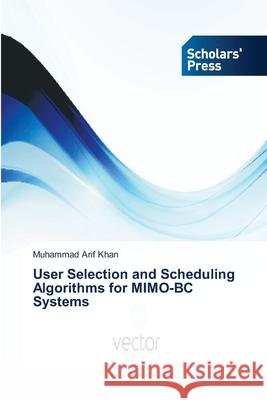User Selection and Scheduling Algorithms for MIMO-BC Systems » książka
User Selection and Scheduling Algorithms for MIMO-BC Systems
ISBN-13: 9783639662597 / Angielski / Miękka / 2014 / 172 str.
This book investigates the problem of user selection and scheduling in MIMO-BC. A low-complexity user selection algorithm is proposed when the BS has perfect channel-state information and the performance of the proposed algorithm with linear and non-linear precoding techniques is evaluated. A signalling scheme for the MIMO-BC systems in the absence of perfect CSIT is presented. A novel transmit-antenna selection scheme is proposed. The performance of the proposed scheme with different user selection algorithms and linear receivers is evaluated. The book considers a cross-layer scheduling approach in order to provide QoS guarantees to the users. A scheduling algorithm, multi-user α-Rule scheduling, is proposed with the capability of maximizing the system throughput and providing QoS to the users. The effect of rate estimation on the performance of the scheduling algorithm is analyzed along with the effect of the variability in the allocated rates on the mean queue lengths of the users. It is shown that by increasing the fairness, the variability in rate allocation decreases, which results in smaller queue sizes for the users with marginal reduction in the sum-capacity of the system.
This book investigates the problem of user selection and scheduling in MIMO-BC. A low-complexity user selection algorithm is proposed when the BS has perfect channel-state information and the performance of the proposed algorithm with linear and non-linear precoding techniques is evaluated. A signalling scheme for the MIMO-BC systems in the absence of perfect CSIT is presented. A novel transmit-antenna selection scheme is proposed. The performance of the proposed scheme with different user selection algorithms and linear receivers is evaluated. The book considers a cross-layer scheduling approach in order to provide QoS guarantees to the users. A scheduling algorithm, multi-user α-Rule scheduling, is proposed with the capability of maximizing the system throughput and providing QoS to the users. The effect of rate estimation on the performance of the scheduling algorithm is analyzed along with the effect of the variability in the allocated rates on the mean queue lengths of the users. It is shown that by increasing the fairness, the variability in rate allocation decreases, which results in smaller queue sizes for the users with marginal reduction in the sum-capacity of the system.











